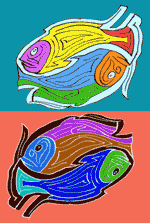|
Long way around
While I was in Iran, expatriate Europeans told me they had heard of a cheap way to get back, and they asked me to try it and report to them. At the time, the Russians and the Americans were competing for influence in Afghanistan, and the Russians offered a favorable exchange rate, which meant that you could in Kabul buy a cheap ticket on the Russian airline Aeroflot. So I traveled east instead of west, to the city of Mashhad, which means “place of pilgrimage”; it happened to be Arba'in, “forty,” the last day of mourning for the Shia martyrs; flagellants, ox blood on the street encircling the forbidden shrines. I got a bus on to the last village, but had to walk from there because relations with Afghanistan were bad and there was no vehicle except a once-weekly mail van; I slept along the way; howls of wolves crossing the dirt road. I was stuck at the Afghan border post, but not for a week, because there came two Landrovers of Britons and Americans aiming to make a film in the North West Frontier. From Herat they wanted to go on through the central mountains so as to see the recently discovered minaret of Jam. But the government, nervous of foreigners stirring up parts of the country barely under its control, allowed travel only along the road, or rather route, looping through the south. I spent a day arguing for my friends, which was good for my Persian but against my own interest since I would lose my ride. Permission was denied, they drove on east anyway, but were forcibly brought back, so that a few days later they overtook me and picked me up again, and again I was their interpreter when we stopped to buy food. At Girishk, American engineers were doing works on the copious waters of the Helmand, we camped on their lawn, I heard music, Afghan workmen were bivouacking among the reeds, and the film-makers were glad to record songs in Farsi, which I knew how to translate, and Pashto, which I did not. We went on through Qandahar, where (as recounted elsewhere) I encountered my double, and Ghazni, to Kabul. Eventually I bought my Aeroflot ticket, and went to get a visa for the Soviet Union. The consul informed me that he had just received a directive from Moscow: visas were no longer needed. The plane flew over the Hindu Kush and, on the way to Tashkent, made a pause at Termez. This was the ancient town of Tirmidh, on the Oxus (it later became less obscure, as the staging post for American supplies into Afghanistan). The officials asked why I had no visa? They put me on the next plane back to Kabul. But that was not for several days; meanwhile the Intourist agent, who had never had a tourist before, was delighted to guide me around Termez. His name was Boris Kryachko; in exchange for a Shakespeare and a Coleridge which I would send him, he gave me the divans (complete collections) of the poets Sa'di and Hafiz, with, on facing pages, the Persian originals and ‹zbek translations in Cyrillic letters. Back in Kabul, I had to pay a re-entry fee, get a visa, and buy another ticket, so the long way around was, as a way of saving money, a failure. The plane from Tashkent to Moscow was a Tupolev jet. In the middle of the night I woke and saw out of the window a grassy field whose tufts were covered with snow, on which the huge plane was silently at rest. Why was everyone else still sleeping? Then I saw the plane's tiny shadow on the tufts, which were clouds.
BACK
|
